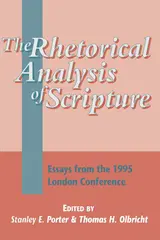

The Rhetorical Analysis of Scripture: Essays from the 1995 London Conference
in Library of New Testament Studies
Pages
505
Publisher
T&T Clark
Published
9/1/1997
ISBN-13
9781850756712
This is the third in a series of conference papers on rhetorical criticism. Held in July 1995 in London, the conference included participants from the United Kingdom, the United States, Canada, Germany, Italy, Switzerland and the Republic of South Africa. Part I is concerned with the past, present and future of rhetorical analysis; Parts II, III and IV are concerned with rhetorical analysis of scriptural texts; and Part V provides a conclusion reflecting on a number of questions raised in Part I. Most of the participants would characterize themselves as advocates of rhetorical criticism; but there were others less convinced that rhetorical criticism is developing as it ought.
- Table of Contents
- Editor's preface
- Abbreviations
- List of Contributors
- Introduction: London papers in perspective - Stanley E. Porter
- Part 1 - The Past Present and Future of Rhetorical Analysis
- Present and future of rhetorical analysis - Vernon K. Robbins
- Word made flesh: Epistemology, ontology and postmodern rhetorics - J.D.H. Amador
- Constructing the dead author: Postmodernism's rhetoric of death - Erika Mae Olbricht
- Flowering of rhetorical criticism in America - Thomas H. Olbricht
- Ancient historical method and the training of an orator - Robert G. Hall
- Part 2 - The Old Testament
- Persuasions in Judges 2.20-3.6: Celebration of differences - J.P.H. Wessels
- Elihu (Job 32-37), garrulous but poor rhetor?: Why is he ignored? - Hendrik Viviers
- Part 3 - The Gospels
- Mark's story of Jesus and the search for virtue - Pieter J.J. Botha
- Argumentation and the problem of authority: Synoptic rhetoric of pronouncement in cultural context - Willi Braun
- Methodological considerations in the determination of the social context of cynic rhetorical practice: Implications for our present studies of the Jesus traditions - L. Gregory Bloomquist
- Part 4 - Paul and His Rhetoric
- Paul's use of irony as a rhetorical technique - Glenn Holland
- Ancient rhetorical analysis and discourse analysis of the Pauline corpus - Stanley E. Porter
- Catalogue in ancient Greek literature - John T. Fitzgerald
- Rhetoric of Romans 5-8 - Jean-Noël Aletti
- Argument from the letter and intent of the law as the primary argumentative strategy in Romans - Ira J. Jolivet, Jr.
- Rhetorical criticism and the Corinthian correspondence - Frank W. Hughes
- Paul, the seer: Rhetorical persona in 1 Corinthians 2.1-16 - Gary S. Selby
- Establishing a new value system in Corinth: 1 Corinthians 5-6 as persuasive argument - Lambert D. Jacobs
- 'Thorn in the flesh'/'Der Pfahl im Fleisch': Considerations about 2 Corinthians 12.7-10 in connection with 12.1-13 - Verena Jegher-Bucher
- Integration of epistolary and rhetorical analysis of Philippians - Duane F. Watson
- Rhetorical reading of the Epistle to Titus - C. Joachim Classen
- Construction of culture through the construction of person: Acts of Thecla as an example - Johannes N. Vorster
- Part 5 - Conclusion
- Reflections on the London Conference on the Rhetorical Analysis of Scripture - David Jasper
- List of Ancient Sources
- List of Modern Authors
Inner Books
This physical volume has several internal sections, each of which has been reviewed independently
- Introduction: London papers in perspective by Stanley E. Porter
- Present and future of rhetorical analysis by Vernon K. Robbins
- Word made flesh: Epistemology, ontology and postmodern rhetorics by J. David Hester Amador
- Constructing the dead author: Postmodernism's rhetoric of death by Erika Mae Olbricht
- Flowering of rhetorical criticism in America by Thomas H. Olbricht
- Ancient historical method and the training of an orator by Robert G. Hall
- Persuasions in Judges 2.20-3.6: Celebration of differences by J. P. H. Wessels
- Elihu (Job 32-37), garrulous but poor rhetor?: Why is he ignored? by Hendrik Viviers
- Mark's story of Jesus and the search for virtue by Phil J. Botha
- Argumentation and the problem of authority: Synoptic rhetoric of pronouncement in cultural context by Willi Braun
- Methodological considerations in the determination of the social context of cynic rhetorical practice: Implications for our present studies of the Jesus traditions by L. Gregory Bloomquist
- Paul's use of irony as a rhetorical technique by Glenn S. Holland
- Ancient rhetorical analysis and discourse analysis of the Pauline corpus by Stanley E. Porter
- Catalogue in ancient Greek literature by John T. Fitzgerald
- Rhetoric of Romans 5-8 by Jean-Noël Aletti
- Argument from the letter and intent of the law as the primary argumentative strategy in Romans by Ira J. Jolivet, Jr.
- Rhetorical criticism and the Corinthian correspondence by Frank W. Hughes
- Paul, the seer: Rhetorical persona in 1 Corinthians 2.1-16 by G. R. Selby
- Establishing a new value system in Corinth: 1 Corinthians 5-6 as persuasive argument by Lambert D. Jacobs
- 'Thorn in the flesh'/'Der Pfahl im Fleisch': Considerations about 2 Corinthians 12.7-10 in connection with 12.1-13 by Verena Jegher-Bucher
- Integration of epistolary and rhetorical analysis of Philippians by Duane F. Watson
- Rhetorical reading of the Epistle to Titus by Carl Joachim Classen
- Construction of culture through the construction of person: Acts of Thecla as an example by Johannes N. Vorster
- Reflections on the London Conference on the Rhetorical Analysis of Scripture by David Jasper